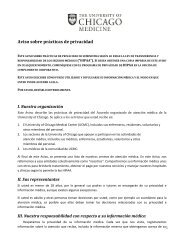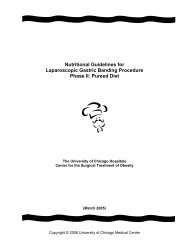Theme: Molecular Mechanisms of Apoptosis, Cell Growth, and Cell SurvivalKay Macleod, PhDAssociate Professor of The Ben May Department for Cancer ResearchAs solid tumors grow, they outstrip their ability to take upoxygen, glucose and other nutrients from the environment bydiffusion. The deficit in oxygen (hypoxia) elicits pleiotropiceffects in mammals, including increased glycolysis, angiogenesis,and erythropoiesis, all processes that maximize ATP generationand nutrient delivery, while also inhibiting processes such ascell cycle progression and protein translation that consumelarge amounts of ATP. The upregulation of glycolysis inparticular results in acidification of the microenvironment,Students and technicians working in one of the UCCRC’s dedicatedforcing adaptation to low pH such that, even when oxygen isresearch facilities, the Ellen and Melvin Gordon Center for Integrativerestored, tumor cells continue to depend on glycolysis and, inScience.some cases, are critically dependent on metabolic enzymes forsurvival. This has been referred to as the “glycolytic switch” andmay represent a novel “hallmark” of cancer that offers an opportunity to specifically target tumor cells, by blocking criticalmetabolic pathways. Another feature of tumor cells that are deprived of oxygen is the induction of autophagy, a survival processthat is activated in response to starvation. Autophagy promotes turnover of cellular constituents to re-generate metabolites andATP. Counter-intuitively, given its role in promoting cell survival, autophagy has been proposed to act as a tumor suppressormechanism via its role in limiting damaging reactive oxygen species by promoting turnover of mitochondria, preventing DNAdamage by maintaining nucleotide pools, and limiting necrosis and associated pro-tumorigenic inflammatory responses.Importantly, autophagy also induces cell cycle arrest, although the mechanism is not known.Work in the Macleod laboratory is focused on understanding the molecular basis by which hypoxia, oxidative stress andautophagy modulate tumor progression and metastasis. In recent years, the laboratory has focused on how cell survival ismodulated in response to hypoxia and nutrient deprivation, and showed for the first time that hypoxic cells induce autophagyto promote survival and that this process is dependent on aspects of the function of BNIP3 and BNIP3L, both HIF-inducibletarget genes. The molecular mechanism by which BNIP3 and BNIP3L promote autophagy is a key focus of on-going work in thelaboratory. Hypotheses being tested include a role in directly targeting mitochondria for degradation at the autophagosome toan indirect role in autophagy through effects on mitochondrial fission. Translational work has identified loss of BNIP3 activityas a potential biomarker for the progression of human breast cancer to invasiveness. Using mouse models of breast cancer toassess this and other aspects of autophagy in tumor suppression, the laboratory discovered that some tissues express BNIP3constitutively (such as the heart, skeletal muscle and liver). Phenotypic analysis of BNip3 null mice has highlighted a role forBNip3 in mitochondrial integrity in normal adult hepatocytes and also a novel function for BNip3 in fatty acid metabolismin response to starvation. Continued analysis of the phenotype in these mice is aimed at explaining these observations at themolecular level.The Macleod laboratory is also examining a role for autophagy in modulating outgrowth of disseminated tumor cells. Thepresence of tumor cells in the blood and bone marrow of women presenting with early stage breast cancer, as well as circulatingtumor cells in a significant number of women decades after their initial diagnosis and treatment, indicates that tumor cellscan disseminate early but remain dormant for long periods of time. The mechanisms governing tumor cell dormancy in breastcancer are not understood, but the Macleod group proposes that single cell dormancy brought about by cell cycle arrest may beexplained by the induction of autophagy as the tumor cell finds itself in an inhospitable environment to which it is not evolvedfor growth. The laboratory is exploring the mechanisms by which autophagy induces cell cycle arrest and further validating thiswork in mouse models. Finally, bringing together elements of tumor biology and metabolism, the laboratory is investigatingthe role of autophagy, mitochondrial integrity and metabolism in genetic prediposition to specific cancer types in humanpopulations.10UCCRC SCIENTIFIC REPORT 2009
Marsha Rosner, PhDProfessor of The Ben May Department for Cancer ResearchThe Rosner laboratory focuses on the mechanism by which signals are transmitted within the cell to specify particularoutputs leading to cell growth, differentiation or death. Dr. Rosner’s long-time focus has been on the regulation of the MAPkinase signaling cascade, an evolutionarily conserved kinase pathway that has been implicated in tumor cell progression,invasion and metastasis. Recent work from the laboratory has elucidated novel signaling cascades that regulate tumorcell cycle progression and metastasis via mechanisms involving microRNAs. One aspect of Dr. Rosner’s work involvescharacterizing the mechanism by which Raf Kinase Inhibitory Protein (RKIP), functions as a suppressor of breast cancermetastasis.Cell Signaling &Gene RegulationTumor metastasis suppressors are inhibitors of metastatic progression and colonization and, as such, represent importantmarkers for prognosis and potential effectors of therapeutic treatment. However, the mechanisms by which metastasissuppressors function are generally not understood. RKIP has been implicated as a suppressor of lung metastasis in a murinemodel using androgen-independent prostate tumor cells. A modulator of key regulatory pathways in mammalian cells, RKIPinhibits MAP kinase (MAPK) signaling by binding to Raf-1, preventing Raf-1 phosphorylation at activating sites. RKIP alsosuppresses NFkB activation, inhibits GRK2-mediated downregulation of G protein-coupled receptors, and potentiates theefficacy of chemotherapeutic agents. The Rosner laboratory has recently shown that RKIP ensures chromosomal integrityand genomic stability by preventing MAPK inhibition of Aurora B kinase and the spindle checkpoint. RKIP is missing ordepleted in a number of cancers including prostate, breast, melanoma, hepatocellular, and colorectal, suggesting that it mayfunction as a general metastasis suppressor for solid tumors. The Rosner laboratory has analyzed gene expression data fromprimary human breast tumors and determined that the RKIP signaling pathway is a prognostic marker for metastasis-freesurvival of breast cancer patients.Dr. Rosner’s recent studies have shown that RKIP suppresses invasion and metastasis by inhibiting the MAP kinase (MAPK)signaling pathway and inducing the microRNA let-7. MicroRNAs are noncoding RNAs of ~22 nucleotides that regulate keyprocesses in growth and development and have been implicated as tumor oncogenes or suppressors in cancer. Let-7/miR-98is an evolutionarily conserved microRNA family that has been implicated as a tumor suppressor of colon and lung cancer, andlet-7 loss is associated with breast tumors as well as other less differentiated human cancer cells. Let-7 has also been shownto suppress breast cancer stem cell properties (self-replication and pluripotent differentiation to multiple cell types) as well asproliferation and breast tumor growth. Thus the microRNA let-7 is an important link between regulation of metastasis andregulation of embryonic and cancer stem cells.Although let-7 has been implicated as a suppressor of breast cancer metastasis, few of its downstream signaling targets areknown. To determine which potential let-7 targets regulate metastatic progression upon loss of RKIP expression, The Rosnerlaboratory, in collaboration with Dr. Andy Minn, developed a new strategy based on gene set analysis of gene expressiondata from >1200 human breast tumors. The goal was to negatively correlate expression of putative let-7 targets with RKIPexpression. A similar approach was used to identify bone metastasis signature (BMS) genes that might be regulated by RKIP.The Rosner laboratory identified a novel RKIP/let-7-regulated signaling cascade, involving transcription factors that regulatekey BMS genes, and enabled the use of this cascade in predicting metastatic risk in patients. Dr. Rosner hopes to test thesepredictions in the clinic to determine their prognostic and therapeutic potential for both identifying patients most likely tosuffer metastatic disease as well as to identify the most effective treatments.UCCRC SCIENTIFIC REPORT 200911
- Page 1 and 2: Collaborate Explore Discover2008-20
- Page 3 and 4: Immunology& CancerClinical & Experi
- Page 6 and 7: AdministrationUCCRC Executive Commi
- Page 8 and 9: Program 1Cell Signaling and Gene Re
- Page 10 and 11: 8MembersInvestigator*Kenneth Alexan
- Page 14 and 15: Theme: Cell Motility, Cell-Cell Adh
- Page 16 and 17: Theme: Systems Biology and Genetic
- Page 18 and 19: Theme: Developmental BiologyIlaria
- Page 20 and 21: Additional Program Highlights*Resea
- Page 22 and 23: Selected Publications* : Intraprogr
- Page 24 and 25: Lang D, Mascarenhas JB, Powell SK,
- Page 26 and 27: Granovsky AE, Rosner MR. Raf kinase
- Page 28 and 29: Selected Major Grants and AwardsThe
- Page 30 and 31: Program 2Molecular Genetics and Hem
- Page 32 and 33: MembersInvestigator*John Anastasi M
- Page 34 and 35: Theme: Pathogenesis of LeukemiaDoro
- Page 36 and 37: The ultimate goals of the laborator
- Page 38 and 39: Additional Program Highlights*Resea
- Page 40 and 41: Selected Publications* : Intraprogr
- Page 42 and 43: * Knight JA, Skol AD, Shinde A, Has
- Page 44 and 45: * # Gordon MK, Sher D, Karrison T,
- Page 46 and 47: Program 3Immunology and CancerScann
- Page 48 and 49: MembersInvestigator*Erin Adams PhDM
- Page 50 and 51: and αβ TCRs are well known, the l
- Page 52 and 53: transcriptional profile in the tumo
- Page 54 and 55: ••The impact of regulatory T ce
- Page 56 and 57: Selected Publications* : Intraprogr
- Page 58 and 59: Storb, Ursula MD# Longerich S, Orel
- Page 60 and 61: Dr. Susan Cohn with a patientProgra
- Page 62 and 63:
60MembersInvestigator*Douglas Bisho
- Page 64 and 65:
compared to mice treated with IP ci
- Page 66 and 67:
Using a structure-based rationale,
- Page 68 and 69:
incorporation of other genetic elem
- Page 70 and 71:
Additional Program Highlights*Resea
- Page 72 and 73:
Selected Publications* : Intraprogr
- Page 74 and 75:
Hart, John MD* # Dougherty U, Sehde
- Page 76 and 77:
Nanda, Rita MD# Wei M, Xu J, Dignam
- Page 78 and 79:
# Yang C, Karczmar GS, Medved M, Ot
- Page 80 and 81:
Selected Major Grants and AwardsThe
- Page 82 and 83:
Program 5Advanced Imaging
- Page 84 and 85:
MembersInvestigator*Hiroyuki Abe MD
- Page 86 and 87:
in as many as 86% of the measuremen
- Page 88 and 89:
investigators and engineers from co
- Page 90 and 91:
have important clinical implication
- Page 92 and 93:
Theme: Image-Guided TherapyCharles
- Page 94 and 95:
irradiated to a variety of doses ne
- Page 96 and 97:
Selected Publications* : Intraprogr
- Page 98 and 99:
* Jansen SA, Fan X, Karczmar GS, Ab
- Page 100 and 101:
Program 6Cancer Risk and Prevention
- Page 102 and 103:
MembersInvestigator*Habibul Ahsan M
- Page 104 and 105:
to prostate cancer. The work has ma
- Page 106 and 107:
Dr. Ahsan’s team showed that sele
- Page 108 and 109:
Theme: Psychological and Bio-Behavi
- Page 110 and 111:
Daniel McGehee, PhDAssociate Profes
- Page 112 and 113:
Sarah Gehlert, PhDProfessor of the
- Page 114 and 115:
Selected New Funding•• Lisa San
- Page 116 and 117:
Selected Publications* : Intraprogr
- Page 118 and 119:
Gehlert, Sarah PhD* Gehlert S, Sohm
- Page 120 and 121:
Olopade, Olufunmilayo MBBS* Bradbur
- Page 122 and 123:
Clinical Trials ActivityDr. Alessan
- Page 124 and 125:
The clinical trials activity of the
- Page 126 and 127:
Shared ResourcesDr. Vytas Bindokas
- Page 128 and 129:
Biostatistics Core FacilityScientif
- Page 130 and 131:
collaborations. The Facility mainta
- Page 132 and 133:
The services provided include:•
- Page 134 and 135:
Other Resources and Centers
- Page 136 and 137:
Cancer Resource CenterThe UCCRC off
- Page 138 and 139:
CECOS has successfully developed an
- Page 140 and 141:
Committee on ImmunologyThe Committe
- Page 142 and 143:
The University of Chicago Medical C
- Page 144 and 145:
HighlightsThe Gwen and Jules Knapp
- Page 146 and 147:
Leukemia and Lymphoma Society Speci
- Page 148 and 149:
Institute for Genomics and Systems
- Page 150 and 151:
Systems Biology Approach for the St
- Page 152 and 153:
Immunology and Cancer ProgramMaria-
- Page 154 and 155:
Cancer Risk and Prevention ProgramA
- Page 156:
www.uccrc.uchicago.eduEditor: Hoyee
















